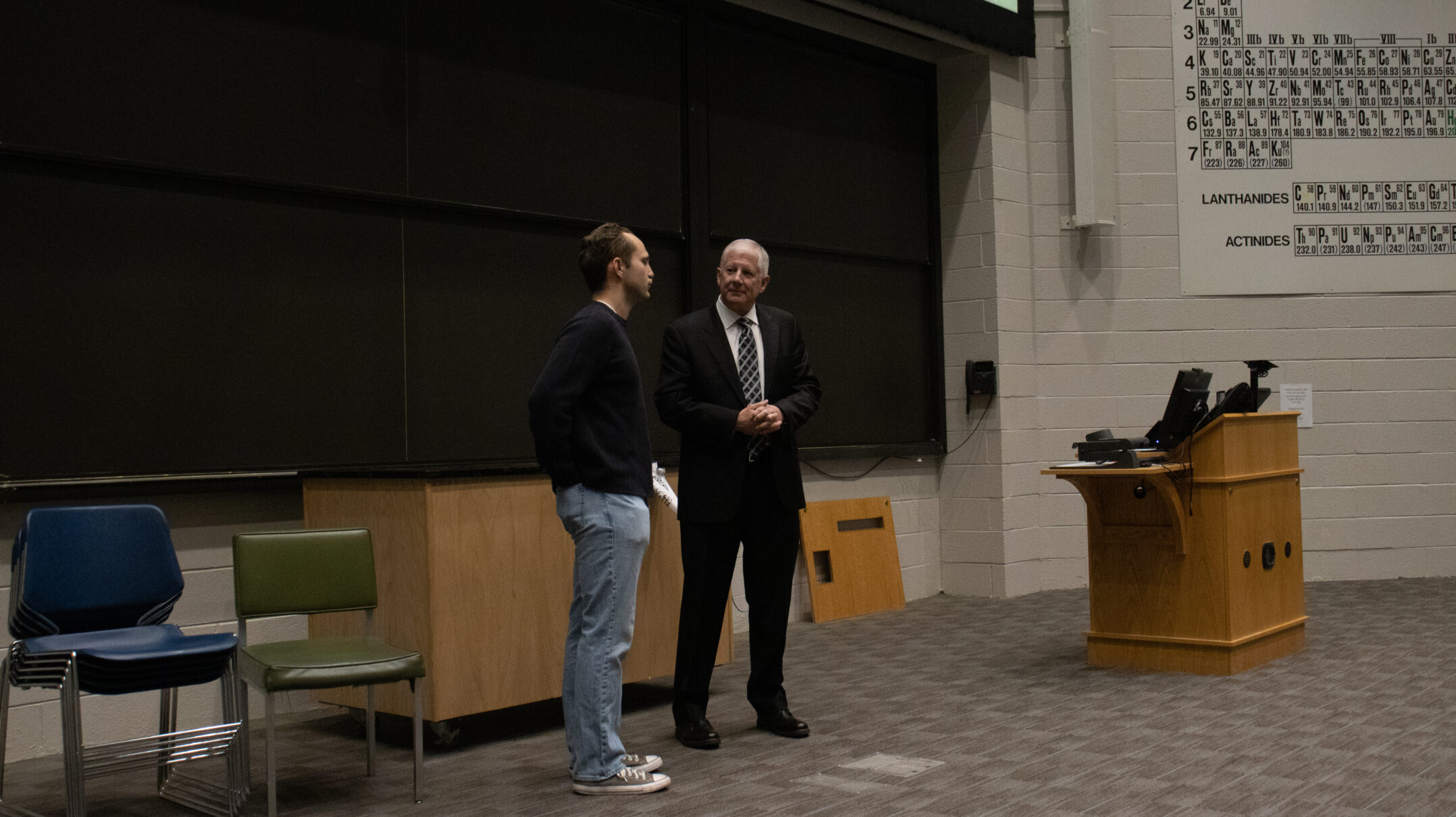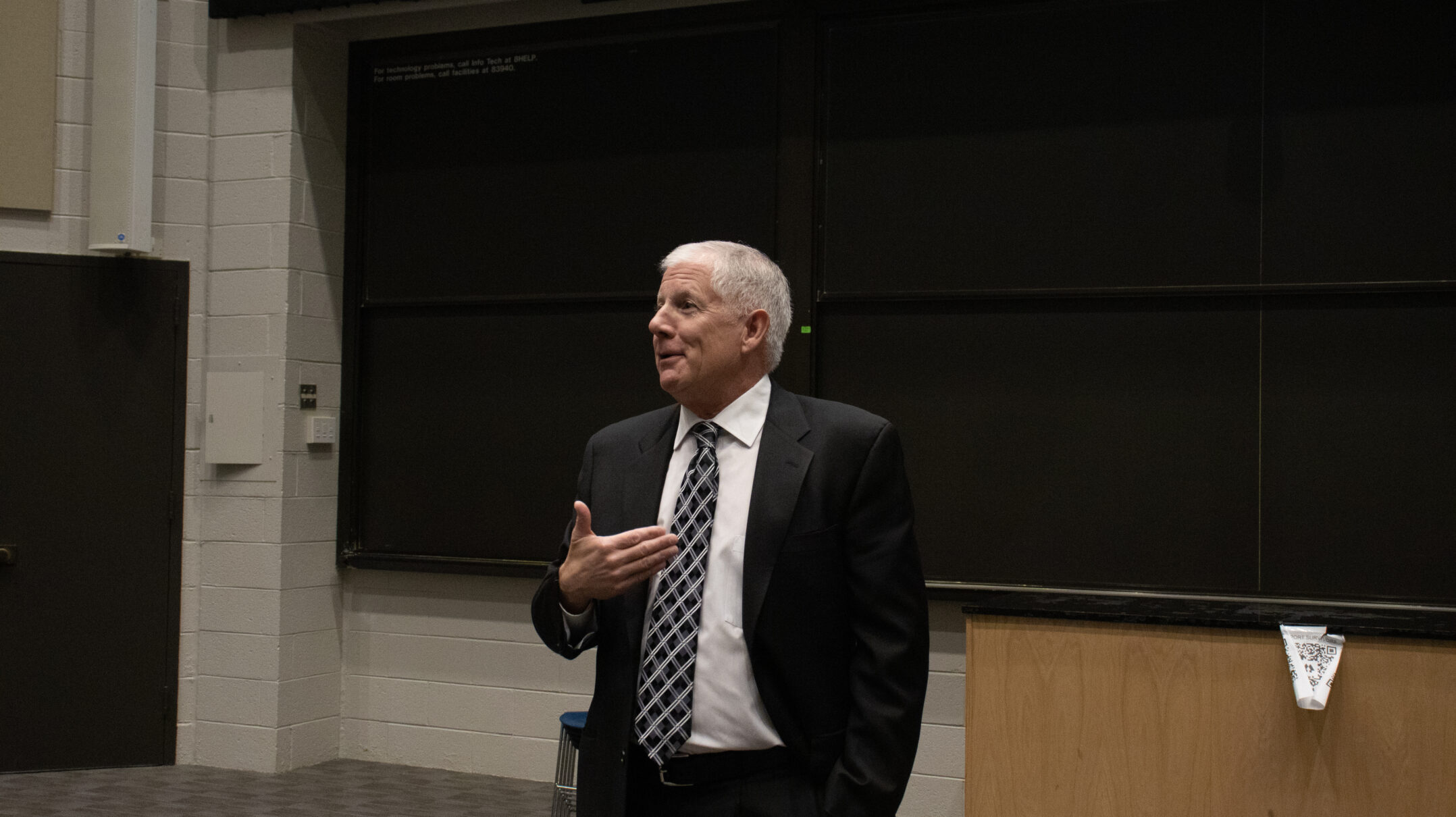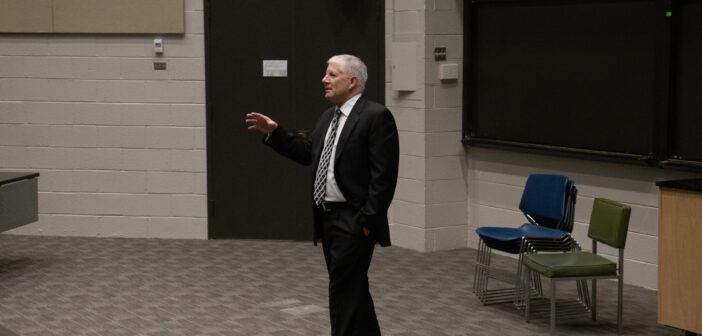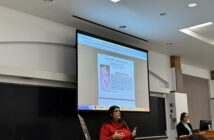Brian Fife, chair of Lehigh’s political science department, spoke to students Tuesday about the consequences of elections.
Fife’s speech, held in Neville Hall, was part of programming for Lehigh’s Civic Engagement Day, on which the university canceled classes in an effort to get students to the polls.
He detailed the importance of voting in the midterms, factors contributing to voter turnout and potential outcomes in this year’s election.
Fife said the United States’ 46.5% voter turnout in the 2018 midterms was the highest for a midterm in the modern era, which began in 1932. He said this was good news, but the bad news is that still more than half of the adult population chose not to participate at all.
Fife said the 2020 presidential election saw the highest voter turnout since the 1960 presidential election between John F. Kennedy and Richard Nixon.
According to a study from Tufts University, 66% of college students cast a vote that year, a 14% increase from the 2016 election.

Declan Coster, ’23, (left) introduces political science professor Brian Fife (right) at Neville Hall on Tuesday, Nov. 8, 2022. Fife spoke to students about the consequences of elections on Lehigh’s Civic Engagement Day. (Nahjiah Miller/Photo Editor)
A Washington Post-ABC News Poll from September indicated only 49% of young Americans (ages 19-29) said they were “absolutely certain” to vote. 63% of those aged 30-64 and 84% of those 65 and older affirmed the same statement.
Kate Lyden, ‘24, attended the speech and said she enjoyed how Fife came prepared with statistics.
“Even if you consider yourself to be politically educated or knowledgable, there is still a lot that you (can) learn,” Lyden said. “I appreciated him taking the time to talk about the value of voting.”
In an interview after his speech, Fife said political scientists would reject the idea that young people of voting age don’t vote because they are either apathetic or lazy.
“People vote and are engaged in politics based on their perceptions,” Fife said. “That term, ‘perception,’ is very important. If a person perceives that she or he has a lot at stake in an election, that person is more likely to be engaged and to participate. In America, that means middle aged and older Americans perceive themselves to be bigger stakeholders, and younger people don’t perceive themselves to be that way yet.”
During his speech, Fife said voter registration has a disparate impact on young people in particular, and that it makes it unnecessarily difficult to vote.
Fife said we have the technology to track voter registrations without requiring them 30 or 20 days before the election, and advocated for same day voter registration.
“I can go in and process a credit request to buy an $80,000 truck in 5-10 minutes,” Fife said. “I would urge your generation to promote change, in a non-partisan way. It has nothing to do with for whom you vote, it has everything to do with opening up access.”
The voter registration deadline in Pennsylvania was Oct. 24, 15 days before the Nov. 8 election.

Fife spoke about the accessibility of voting in his Tuesday, Nov. 8, 2022 speech in Neville Hall. (Nahjiah Miller/Photo Editor)
Deadlines vary state by state: 15 states have deadlines 28-30 days before the election, 10 states’ deadlines are 20-27 days before, six states (including Pennsylvania) have deadlines one to 15 days before and 18 states, plus Washington, D.C., allow same day voter registration. North Dakota is the only state in the union in which voters do not have to register themselves.
Fife’s home state of Maine was the first to pass same day voting legislation in 1973.
Fife said college voters are at a different point in time (in their lives), and that they may not fully appreciate the fact that the outcome of elections affect them just as much as older voters.
“They’re into their education, they’re into their social lives and they’re not established in terms of profession or where they live,” Fife said. “They may not be established in terms of family relationships.
Alex Tang, ‘25, who attended the event, said he follows politics closely and appreciated Fife’s insight and experience.
“In terms of rhetoric, the style of politics has become more divisive,” Tang said. “The sentiment that we discussed is that presidents and leaders of both parties should encourage Americans to do their duty for the sake of the country.”
Fife said what concerns him the most about the election is state legislatures’ attempts to suppress votes’
“The reaction to the high rate of participation in 2020 was very negative in a number of states,” Fife said. “I do think there’s an overt attempt to thwart that high turnout by making it more cumbersome for certain people to vote, and I think that’s unacceptable in a democratic republic.”






Comment policy
Comments posted to The Brown and White website are reviewed by a moderator before being approved. Incendiary speech or harassing language, including comments targeted at individuals, may be deemed unacceptable and not published. Spam and other soliciting will also be declined.
The Brown and White also reserves the right to not publish entirely anonymous comments.